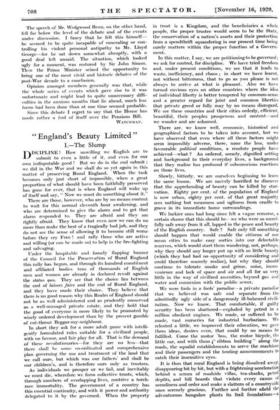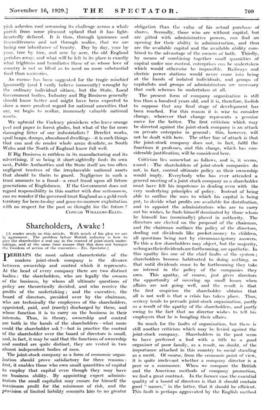" England's Beauty Limited "
1.—The Slump
DISCIPLINE! How unwilling we English are to submit to even a little of it, and even for our own indisputable good ! But we do in the end submit ; we did in the War and we shall do so yet again in this matter of preserving Rural England. When the task becomes only just short of impossible, when a great proportion of what should have been faithfully preserved has gone for ever, that is when England will wake up of itself and say, " Now we must do something about it."
There are those, however, who are by no means content to wait for this normal eleventh hour awakening, and who are determined to give the alarm and to get that alarm responded to. They are afraid and they are rightly afraid. They know that even now we can do no more than make the best of a tragically bad job, and they do not see the sense of allowing it to become still worse before they cry FIRE ! and rally those who are active and willing (or can he made so) to help in the fire-fighting and salvaging.
Under the hospitable and . loosely flapping banner of the Council for the Preservation of Rural England this rally has begun, and through its hundred constituent and affiliated bodies tens of thousands of English men and women are already in declared revolt against the status quo. They see that the choice lies between the end of laissez faire and the end of Rural England, and they have made their choice. They believe that there is no good reason why this Realm of England should not be as well administered and as prudently conserved as a well-managed private estate, and they hold that the good of everyone is more likely to be promoted by wisely ordered development than by the present gamble of cut-throat Beggar-my-neighbour.
In short they ask for a more adult game with intelli- gently formulated rules suitable for a civilized people, with no favour, and fair play for all. That is the demand of these revolutionaries—for they are no less—that there shall be some co-ordinated and comprehensive plan governing the use and treatment of the land that we call ours, but which was our fathers' and shall be our children's, and is therefore ours only as trustees.
As individuals we prosper or we fail, 'and inevitably we must die, wherefore we form collective trusts, which, through numbers of overlapping lives, contrive a torch- race immortality. The government of a country has this essential continuity, and with it power and authority delegated to it by the governed. When the property in trust is a Kingdom, and the beneficiaries a whole people, the proper trustee would seem to be the State, the conservation of a nation's assets and their protection from a spendthrift squandering in our present time being surely matters within the proper function of a Govern- ment.
In this matter, I say, we are petitioning to be governed ; we ask for control, for discipline. We have tried freedom and, under present conditions, we see that it leads to waste, inefficiency, and chaos ; in short we have learnt, not without bitterness, that to go as you please is not always to arrive at what is pleasant. Also we have turned envious eyes on other countries where the idea of individual liberty is better tempered by common-sense and a greater regard for joint and common liberties that private greed or folly may by no means disregard: We see these countries and their cities orderly, efficient, beautiful, their peoples prosperous and content—and we wonder and are ashamed.
There are, we know well, economic, historical and geographical factors to be taken into account, but we have observed that even where all these factors might seem impossibly adverse, there, none the less, under favourable political conditions, a resolute people have achieved—what ? An ordered, seemly, dignified setting and background to their everyday lives, a background that they realize has profound if subconscious reaction4 on those lives.
Slowly, bitterly, we are ourselves beginning to learn the same lesson. We are naively horrified to discover that the apprehending of beauty can be killed by star- vation. Eighty per cent. of the. population of England is now urban, eighty per cent. of that great majority sees nothing but meanness and ugliness from cradle to grave in its immediate home surroundings.
We luckier ones had long since felt a vague remorse, a certain shame that this should be— -we who were so merci- fully safe away from it all, lapped in the peace and beauty of the English country. Safe ? Safe only till something should happen that would enable the citizens of our mean cities to make easy sorties into our delectable reserves, which would start them wondering, not, perhaps, why they should any longer put up with so little beauty (which they had had no opportunity of considering and could therefore scarcely realize), but why they should continue to tolerate smoke and grime, noise, incon- venience and lack of space and air and all for so very little in the way of civilized amenities, beyond gas and water and connexion with the public sewer.
We were fools in a fools' paradise—a private paradise that we believed was safe and separate from the admittedly ugly side of a dangerously ill-balanced civili- zation. Now we know. That comfortable, if guilty security has been shattered—exploded by petrol in a million obedient engines. We made, or suffered to be made, vast nurseries for industrial barbarians. We relented a little, we improved their education, we gave them ideas, desires even, that could by no means be fulfilled. Come the motor 'bus, the motor bicycle, the little car, and with them j" ribbon building " along the roads, the squalid establishments to serve the machines and their passengers and the touting announcements to catch their insensitive eyes.
It is thus that rural England is being dissolved away, disappearing bit by bit, but with a frightening acceleration behind a screen of roadside villas, tea-shacks, petrol depOts, and bill boards- that violate every canon of seemliness and order and make a slattern of a countryside, once serenely gracious. .Further and further afield' the adventurous bungalow plants • its frail foundations—a pink asbestos roof screaming its challenge across a whole parish from some pleasant upland that it has light- heartedly defaced. It is thus, through ignorance and insensitiveness and not through . malice, that we are losing our inheritance of beauty. Day by day, year by year, tree by tree, and acre by acre, the old England perishes away, and what will be left in its place is exactly what frightens and humiliates those of us whose love of Country is not so blind as to need no more substantial food than memories.
An excuse has been suggested for the tragic mischief ignorantly (and I verily believe innocently) wrought by the ordinary individual citizen, but the State, Local Government bodies, Industry and Big Business generally should know better and might have been expected to sbow a more prudent regard for national amenities that are, we begin to realize, immensely valuable national assets.
We upbraid the Cockney picnickers who leave orange peel and paper in forest glades, but what of the far more damaging litter of our industrialists ? Derelict works, spoil heaps, dumps, abandoned dwellings—it is such things that can and do render whole areas desolate, as South Wales and the North of England know full well.
If Big Business is ruthless in its manufacturing and its advertising, if so being it short-sightedly fouls its own nest, Public Authorities and the State itself are too often negligent trustees of the irreplaceable national assets that should be theirs to guard. Negligence in such a trust amounts to a fraud—a cruel fraud upon all future generations of Englishmen. If the Government does not regard responsibility in this matter with due seriousness, can we wonder if the governed treat England as a gold-rush territory for here-to-day and gone-to-morrow exploitation with no respect for the past or thought for the future ?
CLOUGH WILLIAMS-ELLIS.









































 Previous page
Previous page